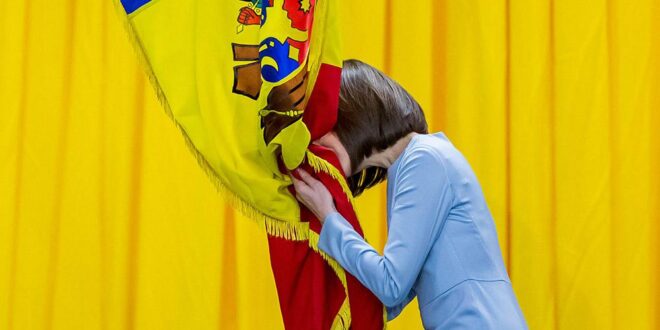Moldovan President Maia Sandu is going all in on EU integration successes as she looks to win presidential elections in the fall.
The second half of 2024 will be a tense time for Moldova, with a presidential election scheduled for the fall in which President Maia Sandu will seek reelection. With official negotiations on Moldova’s accession to the European Union having begun on February 7, Sandu is preparing to stake everything on EU integration: the one area in which she and her party have seen unmitigated success.
Sandu won the last presidential election in 2020, and her party—the pro-EU, liberal Party of Action and Solidarity (PAS)—has been governing since 2021. This has been a turbulent time in Moldovan politics with the coronavirus pandemic, energy crisis, Russia’s full-scale invasion of Moldova’s neighbor Ukraine, an influx of Ukrainian refugees, disruption to supply chains, and loss of traditional markets.
PAS didn’t cause those problems, but that doesn’t alter its responsibility for handling them, or for communicating the challenges to the Moldovan public. And in this respect, at least in private, even representatives of the ruling party admit there have been numerous problems. Having positioned themselves as an alternative to their arrogant and out-of-touch predecessors, once the opposition found themselves in power, they stopped looking so different after all.
The party, the government, and the president are all seeing their ratings suffer as the price of people’s disappointment. It doesn’t matter what attempts have been made to address the problems. Nor is it enough that there have been no major corruption scandals under PAS (unlike prior to 2020).
Sandu appears to be the epitome of integrity and modesty. Her administration officials say that during the 2021–2022 energy crisis, when Moldova had to buy gas at exorbitant prices, she insisted on cutting the cost of heating the huge presidential administration building in central Chisinau, resulting in people attending government meetings wrapped in blankets to keep warm. The media was not told about the savings made, even though the problem of gas bills dominated the headlines back then.
Instead, Sandu and her team are still blamed for the fact that the country was forced to buy expensive gas in the first place. With public frustration growing, Prime Minister Natalia Gavrilita and her cabinet were dismissed in February 2023. Despite its efforts, the new government led by Prime Minister Dorin Recean hasn’t managed to convince Moldovans that it is effectively addressing their problems. According to polls, no more than 25 percent are currently willing to vote for PAS: a dramatic decrease from the 53 percent who voted for the party back in 2021.
Sandu and her team rode to power on three promises: EU integration, the fight against corruption, and institutional reform, primarily of the judiciary. Progress on the second and especially the third issue leaves much to be desired.
Attempts to reform the judicial system have been clumsy, and only made the authorities look incompetent. Nor has it been possible to stamp out corruption. It’s true there haven’t been any new multi-billion dollar scandals, but many of those who had their snout in the trough in the past have never been punished. Many haven’t even been dismissed.
The lack of progress on judicial reform and the fight against corruption is acknowledged by independent experts, the EU, and even Moldova’s leadership itself. Analysts note that the authorities raised expectations with big promises, and then failed to live up to them.
There have, however, been major achievements when it comes to EU integration. Moldova received official EU candidate status in 2022, and the EU decided in December 2023 to begin official accession negotiations, which started on February 7.
The process was facilitated by Russia’s full-scale invasion of Ukraine. In addition to military and financial assistance for Kyiv, Brussels also decided to begin accession negotiations with the war-torn country, and it was logical to extend this to neighboring Moldova at the same time.
It’s not all down to the invasion, however. Moldova also had to convince the EU, since Brussels could clearly see that judicial reform was stalling. Most of that convincing was done by Sandu, who has a good reputation in the EU, and former foreign minister Nicu Popescu.
In early 2023, Sandu held a massive rally in support of EU integration in Chisinau, where she told the crowds: “Our goal is to make Moldova a full member of the European family by 2030.” None of Moldova’s opposition parties have been able to bring so many people onto the streets.
At the end of last year, Sandu proposed holding a referendum on whether the country should join the EU at the same time as the presidential election. Previously, Moldovan law prohibited combining national elections with a referendum, but PAS voted to change that.
Sandu justified holding the two votes simultaneously by arguing that the referendum would determine the fate of the country for years to come. “We want as many people as possible to come to the polling stations. We know from experience that presidential elections have the highest voter turnout,” she said.
In reality, however, twinning the two votes is also a ploy to boost Sandu’s own political chances. The referendum to join the EU, which is opposed by the left-leaning, Moscow-oriented opposition, will not only mobilize pro-Western supporters of Sandu. It will also bring out those who are dissatisfied with the ruling party, but who support EU integration. By aligning herself so closely with the issue, Sandu may well win over more voters on the day—as long as Moldova is still moving toward EU accession.
Sandu remains the most authoritative figure among Moldova’s many pro-Western political parties, but a credible challenger could emerge from the left. The leader of the pro-Russian Party of Socialists, former president Igor Dodon, who lost to Sandu in the presidential election four years ago, is now Moldova’s second most popular politician. Chisinau Mayor Ion Ceban, a former Socialist member who is in conflict with the national government, is also popular. Neither has yet said he will run.
As the presidential election approaches and the weather warms up, it’s likely that the pro-Russian opposition to Sandu and the ruling party will take to the streets with increasing frequency. And it will be supported by Moscow: morally, materially, and with favorable media coverage.
For Sandu, the stakes are high. The presidential election will be followed by parliamentary ones in 2025, and if Sandu is defeated, this could deal a fatal blow to her party. This is why she has opted for a referendum, and is doubling down on her strong suit: EU integration.
 Eurasia Press & News
Eurasia Press & News



